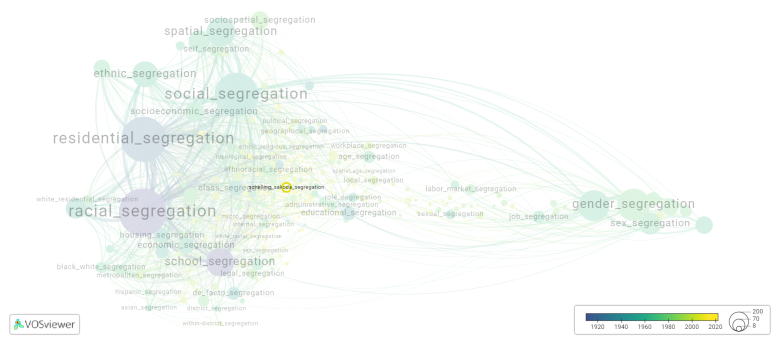Schelling sakoda segregation: Difference between revisions
(Creating page) |
(Creating page) |
||
| (7 intermediate revisions by the same user not shown) | |||
| Line 1: | Line 1: | ||
===== Date and country of first publication<ref>Date and country of first publication as informed by the Scopus database (December 2023).</ref>===== | |||
2020<br> | 2020<br> | ||
France | France | ||
===== Definition ===== | |||
Schelling-Sakoda segregation refers to a social phenomenon where individuals choose to segregate themselves from others based on their characteristics, such as race, ethnicity, or socio-economic status. The term is named after economists Thomas Schelling and Junichi Sakoda, who studied this behavior in the context of residential housing patterns. | Schelling-Sakoda segregation refers to a social phenomenon where individuals choose to segregate themselves from others based on their characteristics, such as race, ethnicity, or socio-economic status. The term is named after economists Thomas Schelling and Junichi Sakoda, who studied this behavior in the context of residential housing patterns. | ||
| Line 10: | Line 10: | ||
The concept of Schelling-Sakoda segregation highlights the role of individual behaviors and preferences in creating and perpetuating segregation, and underscores the importance of addressing these underlying factors to promote diversity and integration. | The concept of Schelling-Sakoda segregation highlights the role of individual behaviors and preferences in creating and perpetuating segregation, and underscores the importance of addressing these underlying factors to promote diversity and integration. | ||
==See also== | ==See also== | ||
==Related segregation forms== | |||
Schelling sakoda segregation is frequently discussed in the literature with the following segregation forms: | |||
[[residential segregation]] | |||
[[File:schelling_sakoda_segregation.png|780x780px]] | |||
This visualization is based on the study [[Segregation_Wiki:About| The Multidisciplinary Landscape of Segregation Research]]. | |||
For the complete network of interrelated segregation forms, please refer to: | |||
* [https://tinyurl.com/2235lkhw First year of publication] | |||
* [https://tinyurl.com/2d8wg5n3 Louvain clusters] | |||
* [https://tinyurl.com/223udk5r Betweenness centrality] | |||
* [https://tinyurl.com/244d8unz Disciplines in which segregation forms first emerged (Scopus database).] | |||
==References== | ==References== | ||
==Notes== | ==Notes== | ||
<references /> | <references /> | ||
{{NoteAI}} | {{NoteAI}} | ||
== | ==Schelling sakoda segregation appears in the following literature== | ||
Collard P. ( | Collard P. (202). Second order micromotives and macrobehaviour. ''Journal of Computational Social Science'', ''3''(1), 209-229. Springer.https://doi.org/10.1007/s42001-020-00062-z | ||
Latest revision as of 07:17, 16 October 2024
Date and country of first publication[1][edit | edit source]
2020
France
Definition[edit | edit source]
Schelling-Sakoda segregation refers to a social phenomenon where individuals choose to segregate themselves from others based on their characteristics, such as race, ethnicity, or socio-economic status. The term is named after economists Thomas Schelling and Junichi Sakoda, who studied this behavior in the context of residential housing patterns.
Schelling-Sakoda segregation occurs when individuals, even if they have no explicit preference for segregation, are more likely to self-segregate due to small biases and preferences in their social interactions. This can lead to the formation of homogeneous communities or neighborhoods, contributing to patterns of segregation in society.
The concept of Schelling-Sakoda segregation highlights the role of individual behaviors and preferences in creating and perpetuating segregation, and underscores the importance of addressing these underlying factors to promote diversity and integration.
See also[edit | edit source]
Related segregation forms[edit | edit source]
Schelling sakoda segregation is frequently discussed in the literature with the following segregation forms:
This visualization is based on the study The Multidisciplinary Landscape of Segregation Research.
For the complete network of interrelated segregation forms, please refer to:
References[edit | edit source]
Notes[edit | edit source]
- ↑ Date and country of first publication as informed by the Scopus database (December 2023).
At its current state, this definition has been generated by a Large Language Model (LLM) so far without review by an independent researcher or a member of the curating team of segregation experts that keep the Segregation Wiki online. While we strive for accuracy, we cannot guarantee its reliability, completeness and timeliness. Please use this content with caution and verify information as needed. Also, feel free to improve on the definition as you see fit, including the use of references and other informational resources. We value your input in enhancing the quality and accuracy of the definitions of segregation forms collectively offered in the Segregation Wiki ©.
Schelling sakoda segregation appears in the following literature[edit | edit source]
Collard P. (202). Second order micromotives and macrobehaviour. Journal of Computational Social Science, 3(1), 209-229. Springer.https://doi.org/10.1007/s42001-020-00062-z

